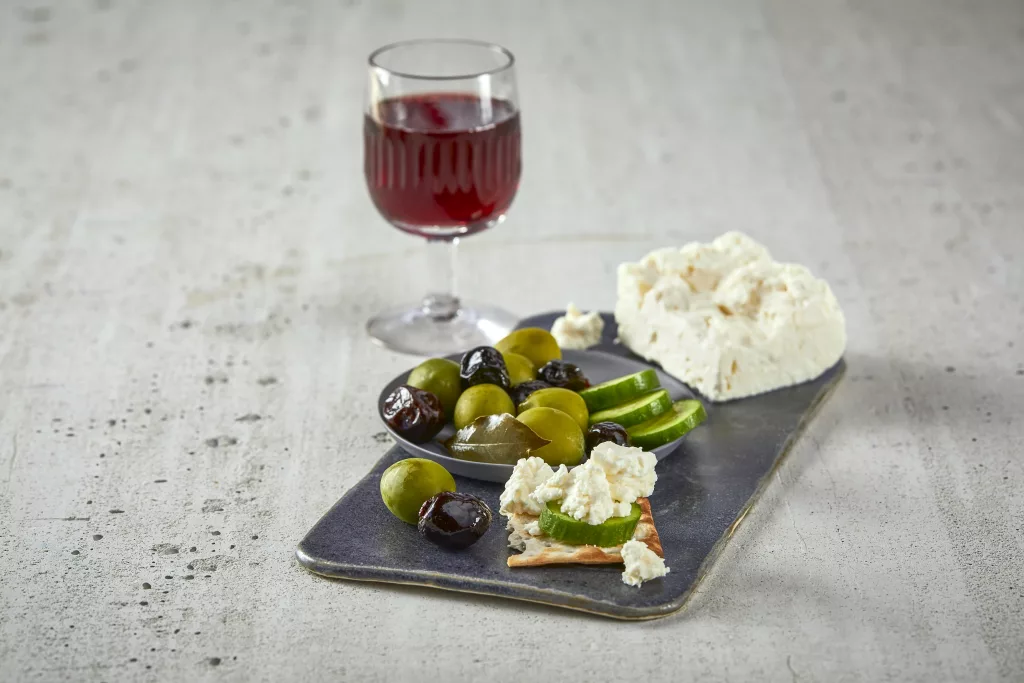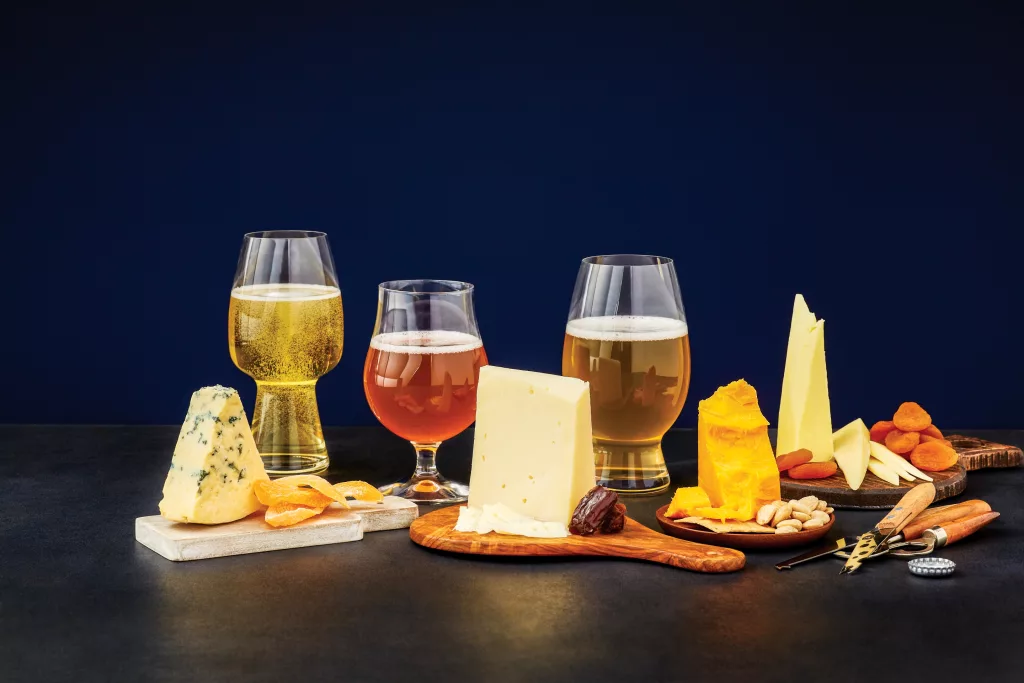Wine and cheese are delicious, but the right combination takes them to a whole up-to-date level.
You may be thinking, “I love cheese.” I love Wine. What else do I need to think about? But when combined effectively, the combination elevates the experience and improves the taste of both.
Plus, it’s a very simple way to impress your friends and family. Are you terrified of the idea of combining cheese and wine? Don’t worry – we’re here to assist. You’ll soon be pairing up like a pro.
Pairing cheese with white wine
Generally speaking, white wines go best with lighter, milder cheeses. Thanks to this, the fresh, often fruity notes of white wine emphasize the sweet creaminess of the cheese. The best white wines to pair with cheese are those that have a little more sweetness and acidity to cut through the buttery palate of the cheese.
Sauvignon Blanc and Wisconsin Brick
Two classic crowd pleasers, together in matchmaking heaven. This original from Wisconsin occurs in varying degrees. The younger, milder Brick is versatile and perfect for burgeoning cheese lovers. Its earthy flavor goes perfectly with the slightly sizzling finish of sauv blanc. A more intensively maturing brick – although delightful to the taste buds – can overpower a fragile wine such as sauvignon blanc.
Chardonnay and mature Parmesan
The buttery flavor of Chardonnay contrasts beautifully with the drier, more sophisticated notes of fine wine Parmesan. The fruity, slightly nutty flavor of the parmesan cuts through the richness of the chardonnay and will have you saying, “Okay, just one more bite” in the blink of an eye.
Champagne and Baby Swiss
Little Swiss it is smoother and creamier than its more renowned parent counterpart. Its glossy, slightly sweet flavor is a crowd pleaser: perfect for holiday celebrations where champagne is a must. The arid notes of the champagne allow the buttery sweetness of the cheese to shine through, and the minuscule holes in the cheese reflect the bubbles of the wine and make you feel that you only have a life together for this moment.
Pairing cheese with red wine

While white wine is best paired with milder cheeses, red wine can complement stronger, mature cheeses. Red wine usually has more tannins, so it goes well with full-bodied, aromatic cheeses. Tannins have a cleansing effect on the palate, making each bite and sip as delicious as the last. Please note that red wine often does not pair well with fresh cheese, as the tannins and low acidity can make fresh cheeses taste chalky.
Beaujolais and feta
This wine is a lighter shade of red, has high acidity and low tannin content. The fruity brightness of Beaujolais pairs perfectly with its salty crispness feta cheese. Putting feta on a cheese board may seem a little strange, but you’ll be pleasantly surprised how much you like it.
Cabernet Sauvignon and blue
Blue cheese it often takes a little palate training to fully appreciate it. (We recommend starting to train your palate as soon as possible.) Cabernet sauvignon is full-bodied, tannic and arid, which pairs well with the stronger, more crumbly blue cheese. Both individually pack a powerful punch, but together they balance out to be a refined listener.
Pinot Noir and Colby
Mild, sweet taste Colby it will not drown out the sophisticated notes of the wine, and the creamy consistency of the cheese harmonizes with the elastic body of the wine. Honestly, it’s pretty tough to go wrong with cheese pairings. Gorgonzola and Swiss would be delicious. Why limit yourself to just one type of cheese?
No fault, no problem

Even if you’re not a huge wine lover, there are plenty of ways to pair cheese with your drink of choice. Here are some breathtaking cheese combinations to suit every mood.
Pilsner and butter cheese
Butter-what? If you’ve never heard of it this opulent, decadent cheese – boy, you want a treat. This semi-soft cow’s milk cheese comes from Germany and literally means “butter cheese”. It’s kind of like Muenster a sophisticated older sister who lived abroad for several years and came back all cosmopolitan. Combined with a airy, hoppy Czech pilsner, you will be transported to the green hills of the Czech Republic.
Cider and aged cheddar
Cheddar goes perfectly with a sweet addition – like fig jam or honey – and cider is a perfect match. Whether you choose a arid or more sweet cider, it will both contrast and complement the opulent, savory flavor mature cheddar. Autumn flavors all year round.
Scotch and Gouda
Just as Scotch can range from airy and fruity to peaty and opulent, gouda it comes in many forms, from flavored, through matured, to smoked. Make sure you choose Gouda and whiskey with similar flavor profiles and strengths so that neither one dominates the other. No matter which variety you choose, the salty, nutty Gouda will certainly add more character to the whiskey.
Ready for wine?
No matter what beverage you prefer, there’s a Wisconsin cheese out there waiting to be consumed. When you’re ready for even more pairing options, you can cruise to up-to-date, cheese-filled horizons with ours extensive list of cheese and drink pairings.
Want a meal or meat pairing to go with all that wine and cheese? We don’t blame you. Explore world of meats and cheesesor choose something else from our offer that suits your style over 300 handcrafted recipes featuring Wisconsin cheese. Share your creation with Wisconsin Cheese on Instagram Or Facebook and become part of the largest cheese community in the world.
Frequently asked questions
Should you combine cheese with white wine or red wine?
Mild, creamy cheeses that are crowd pleasers like Fontina, Swiss and Havarti go best with white wine. Stronger cheeses such as blue, Romano and aged cheddar taste best with red wine.
At what temperature should wine and cheese be served?
White wine should be served chilled and red wine at room temperature. Remove the cheese from the refrigerator two hours before you plan to eat it. However, try to refrain from picking, otherwise everything may disappear before your guests arrive. I’m certainly not speaking from experience.
What cheese goes best with prosecco?
Baby Swiss and Parmesan are great cheeses to pair with prosecco. Buttery, earthy cheeses complemented with arid, sparkling white wine will add splendor to any social gathering. Honestly, get all three and thank us later.
Article and photos courtesy of Wisconsin Cheese.


